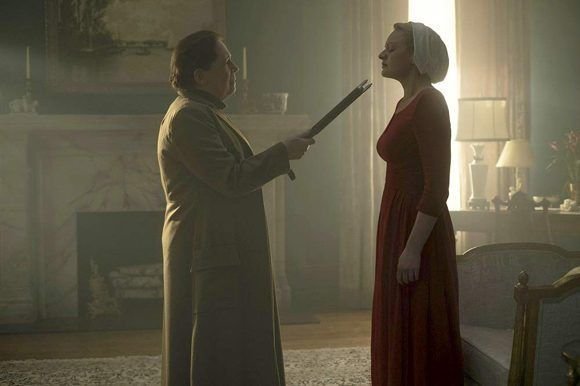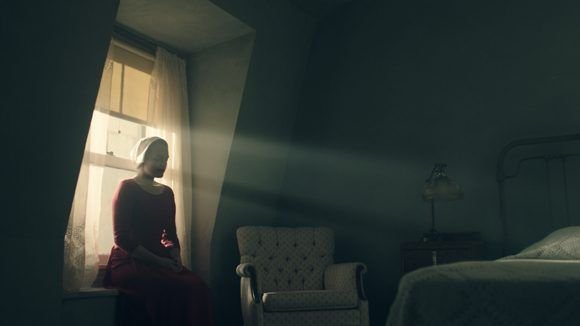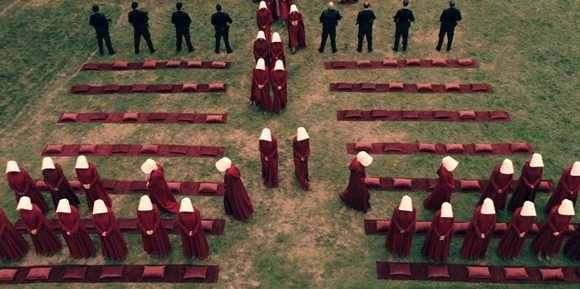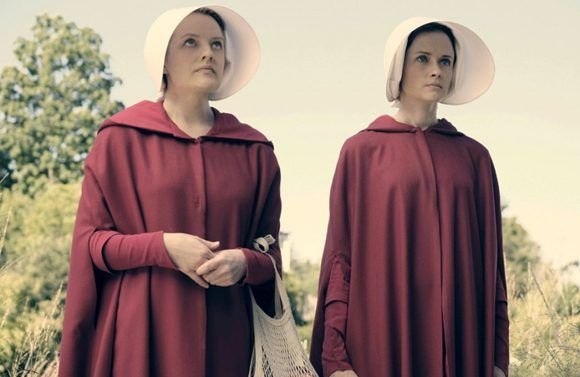
“The Handmaid’s Tale”: The controversy, fiction and a constant provocation
by Yunier Javier Sifonte Díaz
June 17, 2017
Translated and edited by Walter Lippmann for CubaNews.
 The Handmaid’s Tale is perhaps one of the most disturbing TV series of recent times. Provocative in extreme, incisive in its questionings and with a crudity without limits, this production investigates in sensitive areas of the human species and speaks without fear about oppression and the loss of freedom. Fear, corporal punishment and rape, which has become a ritual, coexist with an extraordinary screenplay and attract the applause of the specialized critics, but also the attention of those who wonder where reality ends and fiction begins.
The Handmaid’s Tale is perhaps one of the most disturbing TV series of recent times. Provocative in extreme, incisive in its questionings and with a crudity without limits, this production investigates in sensitive areas of the human species and speaks without fear about oppression and the loss of freedom. Fear, corporal punishment and rape, which has become a ritual, coexist with an extraordinary screenplay and attract the applause of the specialized critics, but also the attention of those who wonder where reality ends and fiction begins.
Based on the novel of the Canadian writer Margaret Atwood’s novel of the same name, the series looks to the near future where environmental pollution has left most women in the United States sterile. Faced with the situation, a radical group seizes power, assassinates the President, annuls the Constitution and implements the Republic of Gilead. In the new society, profoundly fundamentalist and puritanical, most modern values disappear, women lose all their rights and those who can still breed offspring only matter as an object destined to give children to the wealthiest families.
From here, females can only aspire to few roles: a few are the infertile wives of the nation’s leaders, but the rest fulfill functions as maids destined for the repopulation of the country, domestic employees or prisoners sentenced to die while cleaning the areas damaged by the radiation. However, none has the right to read, think or express her views, because, even with the ancestry of ladies or sexual slaves make up that lower group causing the misfortunes of the nation. Among them lives the servant Offred, whose name hardly represents another sign of submission. If she belongs to Commander Fred then she should be named like him.

Corporal threats are recurrent when maids forget their basic rules of behaviour. Photo: Hulu.
This is one of the great successes of the series: the narrative from all possible spaces, with a deep symbolism and a precise structuring of dialogues. From the immutable red dress of the maidservants – joyful to fecundity, but also to blood and pain – through their pre-established attitudes, gestures and conversations, to the cap to restrict their vision of a world they no longer know, everything works to annul their individuality and turn them into standardized subjects.
With different levels of reading and interpretation, for some, The Handmaid’s Tale means a defense of feminism, while for others it represents a good way to reflect on systems of government such as that implemented by the Islamic State or against the rise of neo-fascist or extreme right-wing tendencies in some countries of the planet. At the thematic level, the series does not address current issues such as women’s reification, harassment of homosexuals, ablation [female genital mutilation] or ethical discussions about abortion.
Supported by a millimeter of perfection and an extraordinary passion for detail, director Reed Morano uses whatever element she believes necessary to retrace the path of this deeply misogynistic and inhuman society, to show the harshness of the moment and the anguish of some female characters almost always on the brink of the abyss. Both the careful photography of bluish or ochre tones, as well as the commitment to intimacy in scenes, the punctual use of the soundtrack and the optimal use of some very first shots of Offred’s face -performed masterfully by Elisabeth Moss-, contribute to closing spaces and placing the spectator right in the centre of this asphyxiating drama.
To this end, this maid has two voices, one submissive and fearful and the other known only to the spectator: rebellious, sarcastic, always pungent in the face of the regime’s exaggerations. Narrated by the protagonist from recurrent flashbacks and internal dialogues, the decomposition of society and its silent conversion in the Republic of Gilead appears on screen. “Now I’m awake and I see the world. I was asleep before. That’s how we let it happen. When they massacred Congress, we didn’t wake up. When they blamed the terrorists and annulled the Constitution, we did not wake up either. They said it would be temporary, but nothing changes at all,” recalls Offred to explain how the country arrived in the current state of affairs.

The sobriety of the scenes and the correct use of light give this production a special touch and nuance. Photo: Hulu.
However, these reflections articulate a discourse more anchored to reality and raise questions that are essential for the debate of these times. Does conquering certain universal values such as freedom, democracy and human dignity mean giving up fighting for them? What subsists beneath xenophobia, intolerance, extreme individualism and attempts to construct apolitical or banal subjects?
“Blessed are the meek,” they constantly remind the maids in the centers in charge of training them for their new function, as if eliminating any kind of active posture and making conformism a virtue were an essential objective to achieve domination. And in fact, it is, because the oppression that exists here is not only physical, but also psychological, intellectual and cultural, the only way to dismember a society as a whole.
With seven of the ten chapters of the first season already released and the guarantee of at least one second, The Handmaid’s Tale transcends its exceptional technical skills and its fine adaptation of a classic Canadian literature, but also because it uninhibitedly discusses universal themes such as ideology, morality, humanism, politics and totalitarian and extremist systems. Even without claiming to be a prophetic or apocalyptic work, it has the merit of evading complacent positions and touching sharp areas of a model who likes to see itself as perfect. Responding to the provocations of this series with intelligence and analysis, confronting it without complexes and willing to its art, but also to the debate and questioning, would be good ways to live this story only as fiction.

In this society there is no room for individual initiatives and any activity implies the fulfillment of a ritual. Photo: Hulu.

All the elements surrounding these maids function as symbols of their submission. The regular red dress, the cap, the obligation to go out in pairs to watch each other, are good examples. Photo: Hulu.

You must be logged in to post a comment.